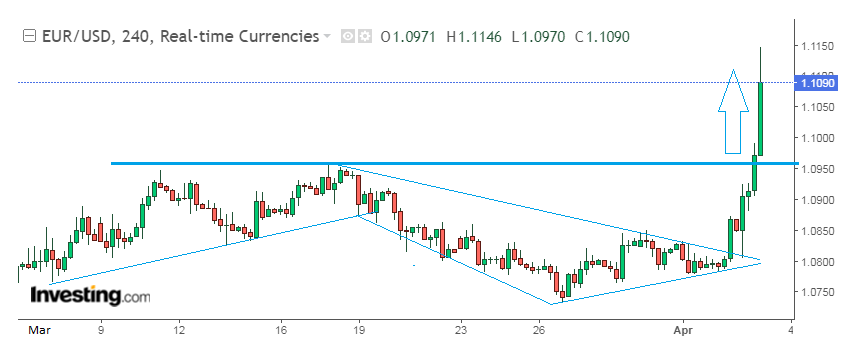The Greenback Is Hardly Naked as the Poker Game Begins
Everybody was well aware of the U.S. and European stocks' readiness to drop to supposedly fresh dips following Trump's aggressive tariff announcement. Even though this could be mostly attributed to effects from the field of psychology, those shifts in the equity market were easily predictable, unlike a fast slump of the Greenback against the same fundamental background. Such a radical shift in the foreign exchange sentiment became a big surprise for me personally, if only because it came from a strange kind of logical construction.
Just look at the typical explanations today. EUR/USD soared from a narrow range between 1.0800 and 1.0850 in early Asian hours to as high as 1.1146 at its peaking price soon after the European afternoon. Meanwhile, analysts at Reuters and Bloomberg shared the view that this happened because the EU goods will be subject to 20% tariffs, while China, Taiwan, Switzerland or Thailand are facing between 30% and 50% tariffs. A good outcome for Europe? That would be the case if the single European currency were to soar against the Chinese, Taiwanese, as well as Swiss or Vietnamese currencies, as Vietnam's export to the U.S. is damaged more than others by the highest tariffs among all U.S. trading partners. But nope, the Euro is soaring against the Dollar, although Trump's recent moves are clearly hurting the European economy in a more painful way than they may hurt the American one.
Hello friends, it is America that will now take more tax money at the border from Europe, and not European governments from America, even if Europe will finally decide to take additional retaliatory measures instead of negotiations to achieve any possible mutual easing of tariff conditions. Who are we fooling when saying that the Euro is allegedly supported by the German government's plan of increasing expenditure on infrastructure and defence. This will hardly boost the Eurozone’s largest economy, as they would only increase cost for budgets at the same moment when the White House declares it wants to spend the accumulated money from higher levies on tax cuts in their own country as well as on reducing the U.S. national debt.
Well, in my humble opinion, it is foreign trading partners, including EU businesses, who will now have to either spend more of their Euros to buy U.S. Dollars at the American border to pay the duties later, or take fewer amount of U.S. Dollars out of the United States after paying those duties to exchange for Euros. Can anyone explain what is positive about this for the Euro? “The blowback of U.S. tariffs onto the U.S. domestic economy leaves the dollar naked,” analysts at ING said today, in a client's note. However, if America is naked in any aspect here, it may play the naked muscles.
If so, frankly speaking, then the only possible reason for the further growth of the Euro, the British Pound and other currencies against the U.S. Dollar, lies in the immediate take-off of large capital by some rich daddies, as they became more afraid for the safety of their lovely money in the now-trumpian America, as soon as Uncle Sam shook his fist at them.
If this is the right thinking of mine, and there is still some logical ground behind this, then the current rise of the Euro by inertia will last no more than a couple of weeks, after which a complete reversal of a newborn mini uptrend will occur. Equity markets will soon recover from temporary dips on both sides of the pond, but Wall Street will regain its strength first and the Euro may reach 1.15, or even touch some relatively higher levels against the Dollar, and then return to usual weakness. If so, Gold will roll back for a while, but then will head to new records again. Bet, gentlemen, the poker game begins, while the Greenback is hardly naked at the table for everybody's fun!

Disclaimer:
The comments, insights, and reviews posted in this section are solely the opinions and perspectives of authors and do not represent the views or endorsements of RHC Investments or its administrators, except if explicitly indicated. RHC Investments provides a platform for users to share their thoughts on financial market news, investing strategies, and related topics. However, we do not guarantee the accuracy, completeness, or reliability of any user-generated content.
Investment Risks and Advice:
Please be aware that all investment decisions involve risks, and the information shared on metadoro.com should not be considered as financial advice. Always conduct thorough research, seek professional advice, and exercise caution when making investment decisions.
Moderation and Monitoring:
While we strive to maintain a respectful and informative environment, we cannot endorse or verify the accuracy of all user-generated content. We reserve the right to moderate, edit, or remove any comments or posts that violate our community guidelines, infringe on intellectual property rights, or contain harmful content.
Content Ownership:
By submitting content to metadoro.com, users grant RHC Investments a non-exclusive, royalty-free license to use, display, and distribute the content. Users are responsible for ensuring they have the necessary rights to share the content they post.
Community Guidelines:
To maintain a positive and respectful community, users are expected to adhere to the community guidelines of Metadoro. Any content that is misleading, offensive, or violates applicable laws and regulations will be subject to moderation or removal.
Changes to Disclaimer:
We reserve the right to update, modify, or amend this disclaimer at any time. Users are encouraged to review this disclaimer periodically to stay informed about any changes.









